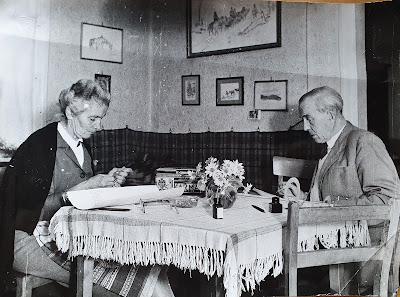My latest non-fiction book, The Last Lancer, was published by Saraband, here in the UK, a couple of weeks ago. It's something of a companion volume to my previous book A Proper Person to be Detained, (the paperback is on special offer on Amazon right now) about the Leeds Irish side of my family, and the mystery of a murder in the family on Christmas Day, 1881.
The other side of the family, the Polish side, was much more exotic, but even more tragic. I'd planned to write about it for many years, collecting material along the way. Fortunately I'd asked my father (that's him on the cover, with the goat) to write down what he remembered of his childhood on the family estate in rural Eastern Poland, a part of the world that is now Ukraine, all the borders having shifted. I'd done a lot more research since his early death in 1995. His anniversary is on 20th March, so he's very much on my mind as I write this. I researched and wrote in earnest during Lockdown. Then, last February, with the book almost completed and about to be submitted to my publisher, Russia invaded Ukraine. And the book suddenly became much more relevant in the saddest possible way.
Our local branch of Waterstones in Ayr had very kindly hosted launches of my previous Saraband titles over many years. They had been joyful experiences, well attended, (local author and all that) and the shop had sold a lot of books. Some of those attending had bought two or three copies as gifts for family members. However, since this year I've been invited to speak at the Boswell Book Festival, at Dumfries House in May, we thought that we might 'launch' Lancer at that event - for which Waterstones supplies books. All the same, because people have been asking me about copies, I'd assumed, in my innocence, that my local store would at least have a few in stock.
Yesterday, finding myself on the High Street and doing my bit for bricks and mortar, I went into the shop, and had a brief look around. No sign of the Last Lancer. So I approached the young man absorbed in his computer behind the counter and asked - very politely - if they were going to be stocking my book. I had a handy copy in my bag. I may have waved it at him in friendly fashion.
He glanced up at me and said 'Is this Boswell?'
It seemed an odd response and I was a little taken aback, but I soldiered on. 'Well yes. I'm doing Boswell in May this year. But I wondered if you were going to be stocking any copies before then.'
He shook his head. 'No. Just for the festival.' He glanced down at his screen. 'I could order you a copy if you like,' he said helpfully.
I declined his kind offer. I have plenty of copies, ordered from my publisher's distributor. I've been sending them out to those who inspired the book or helped with the research and to a few close friends. That very morning, I'd received a beautiful postcard of thanks from one of my literary heroes, Neal Ascherson, whose novel The Death of the Fronsac had been an invaluable source of information.
In fact I've been clinging to that postcard like Jack clinging to Rose's floating door, as evidence that I'm not some elderly imposter.
Still processing the young man's 'just short of rude' response to me, I asked for a copy of HAGS by Victoria Smith - a book that has been widely praised and publicised across social media. This morning, Victoria was on BBC R4, speaking about it. I'd had a look for it while I was hunting for The Last Lancer, and hadn't seen it.
'We should have it,' he said.
As far as I could see, they had a single copy. We found it tucked into a corner, spine rather than striking front cover facing out, low down on the New Non-Fiction shelves. I bought it.
Reflecting on this experience in the sleepless early hours of the morning, it struck me that there could be no better illustration of the thesis of this excellent book. I wasn't looking for recognition. Just a certain amount of interest and engagement. I hadn't become invisible. I had been all too visible, but as an older woman, I was utterly negligible. Or to quote from the introduction to HAGS 'You're still an object. You've just changed in status from painting or sculpture to, say, a hat stand.'
Reader, I was that hat stand.
By the way. You can find The Last Lancer, eBook and Paperback here. And if you'd like to read my novel on a very similar theme, you could try The Amber Heart also as an eBook or Paperback.
You could also buy HAGS while you're at it. I can recommend it.





















